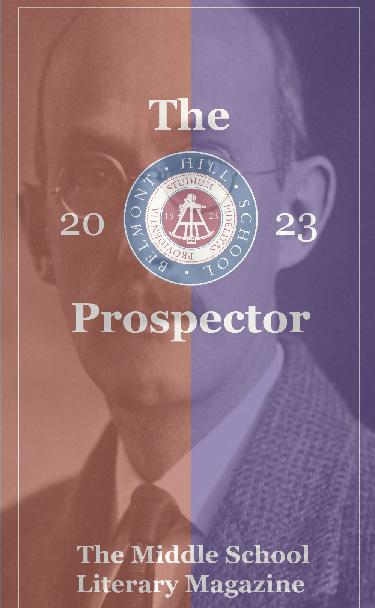
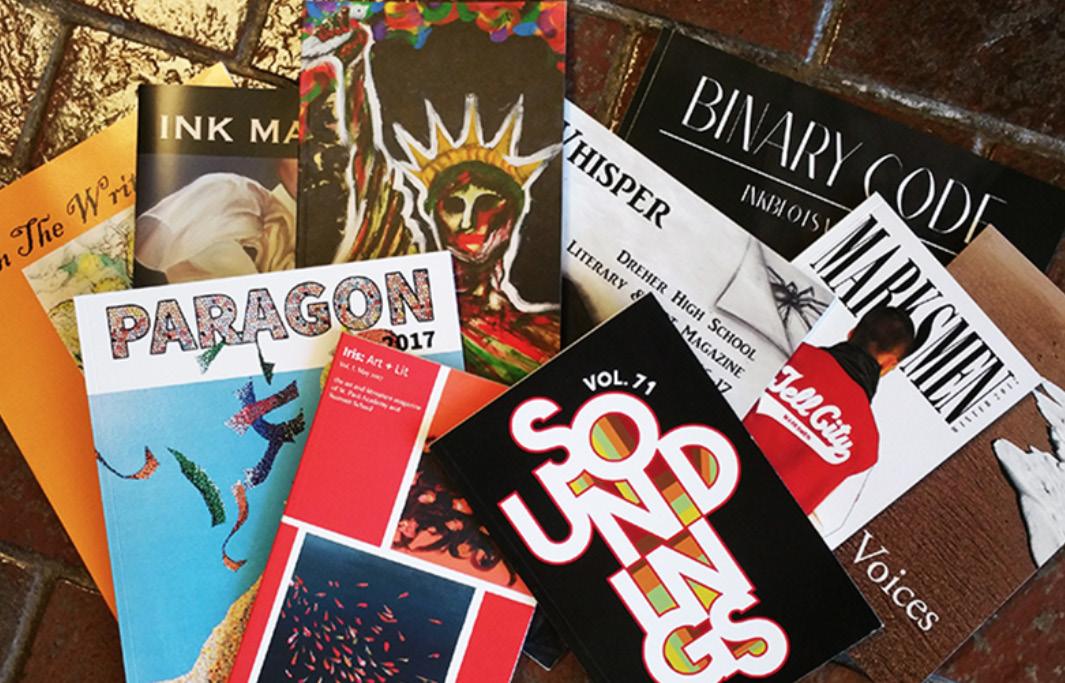
“Success is often achieved by those who don’t know that failure is inevitable.
- Coco Chanel
Contributions

Heads - Jaiden Lee, Samuel Flood, Griffin Vail
Faculty Advisor - Mr. Leonardis


Issue Writers - Ryan Ho, Chase Teeson, Mattias
Liem, Tyler Smith, Matthew Williams, Panos Gianoukos, Rylan Dean, Eli Norden, Michael
Hadley, William Jones, Ben Gong, Henry Ramanathan, Lucien Davis, Adonai Samuel, and Jai Somani
Table of Contents . . . . . . . . . . . . . . . . . Poetry Horizon - Ryan Ho...............................................1-2 MLK - Chase Teeson............................................2-3 Las Meninas - Jaiden Lee.....................................3-6 Worth His Weight in Gold - Mattias Liem........7 Speeches Japanese Food - Ryan Ho.....................................8-11 Through the Pain - Tyler Smith.........................11-15 Creative Writing Why Humans Float in Water - Matthew Williams.............................................15-22 A Long Hot Summer Day - Sammy Flood.......22-24 A Love Like No Other - Griffin Vail..................24-27 Tweet Tweet - Panos Gianoukos........................27-30 Their Last Goodbyes - Rylan Dean....................30-32 A Tradition Like No Other - Eli Norden..........32-34

Table of Contents . . . . . . . . . . . . . . . . . Creative Writing (Continued) Built Different - Michael Hadley....................35-37 Moonlight Sonata.............................................38-39 My Teacher, My Best Friend, My Sister - Ben Gong...........................................................40-42 Twinning - Henry Ramanathan........................43-45 High, Wide, and Handsome - Lucien Davis....46-48 What Belongs to Me That Others Use More Of? - Adonai Samuel..................................................49 The Black Man and an Idiotic Indian Man - Jai Somani..........................................................50-53
By Ryan Ho
The Edge of Space
Was as black as an abyss: a deep place
The Ebony dawns
When there is no trace of the moon’s face
The Edge of Space
As you lose sight
You must use all your might
To battle the internal fright
The Edge of Space
A secret civilization
Deserving appreciation
What a magical creation
The Edge of Space
The Day is new
As your see the beginning of a bright hue
As your hopes come true
Horizon
. . . . . . . . . . . . . . . . .
MLK
By Chase Teeson
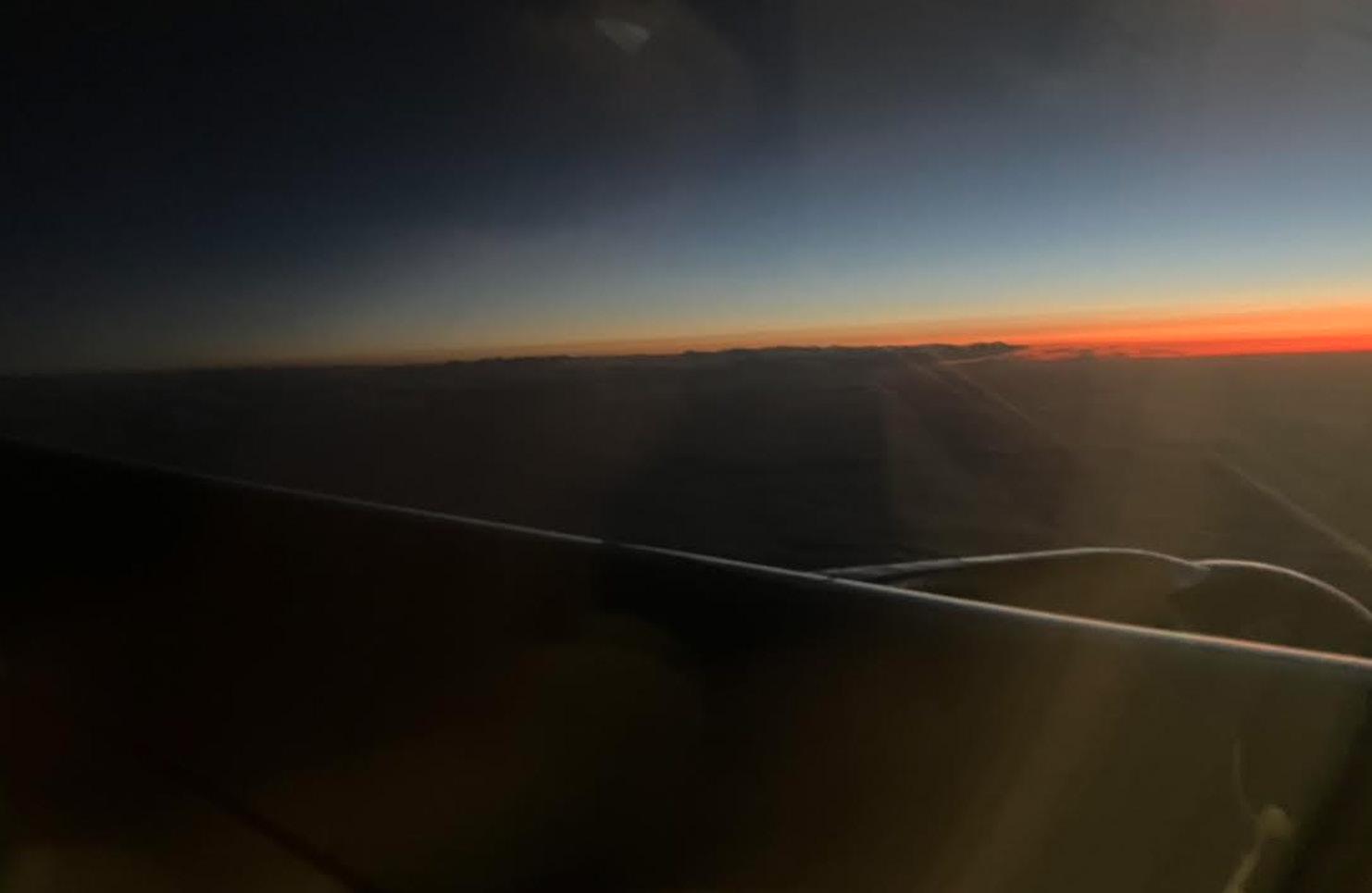
King killed in Memphis
Martin King slain by sniper
Rev. King slain by Memphis Sniper
King Killed in Memphis
Why do we murder our best?
Lincoln, King, Kennedy
Tupac, Malcolm X, Lennon
Lost from an imperfect earth they were trying to per-
. . . . . . . . .
. . . . . . . .
Lost from an imperfect earth they were trying to perfect
The world not perfect enough to accept their imperfect critiques and value
A world less perfect without them
The 39 years with him better than the 100s before and 100s to come
Las Meninas
By Jaiden Lee
as i look, she looks back her small cheeks rosy, content in a high-fashioned way as only a five-year-old can through her adolescent innocence she knows she’s nobility, and merely looks on in a fashion of calm only royalty have she is looking at something—what?
her empty eyes of interest are looking at me!
. . . . . . . . . . . . . . . . .
yet her face gives away nothing except that she knows i can see her young intelligence, placid looking on with mild interest as i desperately attempt to unscramble her nuanced expression her clothes of nobility, her pampered life capture my eyes as maids of honor, chaperones, surround this slight curiosity
the shiny whiteness of her dress the bright point of a painting i can’t help but think is dark, in a moody room of shadows the curious little princess, naive but blameless, infanta margaret theresa
as i look i notice the man, the mind behind it all the all-mighty creator, the genius of art who bends who shifts who molds the image of his royals diego velázquez! he’s looking at me enveloped in an air of distant humor
as he is aware of every detail i take in he, and only he, knows what he is depicting in a calmness that is almost irritating but admirable i look at his canvas what is he painting? who is he painting? me? her?
whoever looks upon his beautiful but dark creation?
as i look, the darkness overwhelms all the artwork in the room but one, one shines, one bursts through in light among the shadows on the wall one of the king and queen—his royalty but no! not a painting—a mirror? a reflection? of what? it reflects what velázquez and the little princess look upon
who does he paint? looking upon so mysteriously? he looks at me, the secret location where according to the puzzling little mirror the king and queen are while i cannot see what his face gives away i realize he is painting
me? the viewer? his humble audience? am i the king and queen? am i nobility? or does he paint me? does he paint the eyes that search his art, the eyes that wonder what is he trying to say? according to velázquez, yes! i can only imagine in those clever eyes all the answers from his painting we come up with is the answer. the careful weaver of his art, the wandering, searching mind of brilliance the magnificent engineer of royal depiction the figure that is behind every canvas the brains behind making the viewer wonder diego velázquez
Worth His Weight In Gold
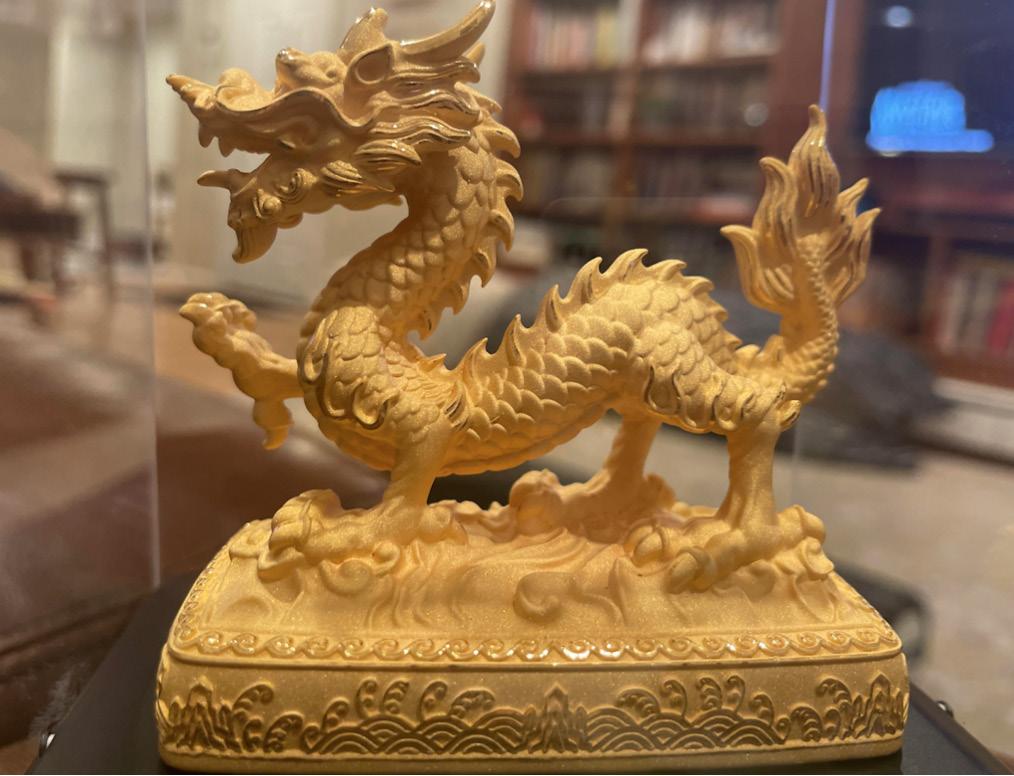 By Mattias Liem
By Mattias Liem
Glimmering and glistening like a golden pearl
He walks around like he rules the world
The sky, the ocean, the sea, and the land
If he sees trouble he will take a stand
If he is messed with no one has a chance
He lets out a roar and stays in his stance
He has always protected his rolling hills
The towns, houses, lakes, and mills
His golden frame is strong and bold
In his towns, there is no one left cold
His scales are shields that can not be broken
Although he is able he has not spoken
Since he is gold he is worth more than the world
Sadly one night he went to bed furled
Something sad happened which gave him a fright
After that, he could never take flight
. . . . . . . . . . . . . . . . .
Japanese Food
By Ryan Ho
Let’s take a moment of silence to think about our food. If you’re like me, you probably don’t think much about food unless you’re hungry. But a couple of hours from now, I bet you’ll be thinking: “I’m starving...what’s for lunch today?” Maybe some of you are already thinking about this. My story takes place in Tokyo. My family visited there a few years ago and eating there was an experience.
My uncle happened to be in Tokyo and told us to meet him at a restaurant and that it would be a surprise. When we reached the restaurant, a fish tank immediately caught my attention. I ran to it, and pressed my face on the glass, fascinated by the fish, but these were not any ordinary fish. One of the small fish swelled up until it became as large as my face, and then some. I jumped back in fright - it was a puffer fish - one of the most deadly fish known to man. Its glands contain a neurotoxin that will kill you
. . . . . . . . . . . . . . . . .
in minutes if you swallow even a tiny amount of it. It is a delicacy in Japan and we were going to try it.
A huge pit began to grow in my stomach, and I did not feel at all comfortable with this. It takes years of training for chefs to learn how to cut away the poisonous part without touching any piece that they serve you. They even need a special license. About 100 people die every year from eating puffer fish prepared by unlicensed chefs.
My uncle told us not to worry - that this restaurant was reputable. But in the back of my mind, I was worried plenty. “What if the chef got distracted and touched a little of the neurotoxin?” When the fish came, I took a bite. It did not have a strong taste, but I hardly noticed that. I waited anxiously to see if I felt any tingling in my throat. I started sweating profusely and breathing heavily. My eyes felt like they were bulging out of my face. My parents looked over at me and said, “Ryan, your face is swelling up - you look just like a pufferfish!” And with that, dinner was over and I was fine.
Another experience I had was eating at an authentic ramen shop. In the restaurant, everyone sat at a long
bar, and each seat was fenced off from the others with a wooden barrier, so you were in a little cubicle by yourself, blocked from the outside world. I noticed a sign in my booth - in English - that read, “Don’t talk, just eat ramen” Below that, it continued, “The main purpose of this space is for you to focus on your ramen”. This was definitely unusual. In front of me was a little curtain. I pushed my order under, and a few minutes later, a steaming bowl of ramen was pushed out to me and I dug in. The sweetness of the pork, the saltiness of the broth, and the added texture of an egg on top. “Mmmm” Every slurp I took was heaven.
What I later realized about the sign is that the chef wanted me to really appreciate the food - that while eating it, I should think about how much thought and care went into making it and I should give the bowl the full attention that it deserved.
I would say that here at home and at school, I usually don’t give much thought to how much care and effort went into the meal on my plate, but I probably should. I take for granted that everything I eat is safe and doesn’t have any neurotoxins that could kill me.
I’m pretty lucky - we’re all pretty lucky not to have to give much thought to food unless we’re hungry.
So today at lunch, I’ll remember that sign I saw in that ramen shop, and I’ll stop talking for a moment, focus on the food, and appreciate it.
Through The Pain
By Tyler Smith
Only a day after his birthday and a little over one year ago, my father and I were lifting like any other day. Nothing seemed out of the ordinary, except for the fact he had a slight cough. Not surprisingly, it was mid-winter, and everyone in our family had gotten a bit of a cold. But as soon as we were done, instead of doing our post-lift cardio and stretch, he went straight to the couch, and he stayed there for the next 2 weeks. Over those 2 weeks, each day he became progressively worse. We thought that it was just the sickness working its way through his body, but after his first
. . . . . . . . . . . . . . . . .
chest X-ray, we knew there was something much nastier going on inside him. Everybody wanted to send him to the hospital, except for him. Even his own doctor was concerned, so as a last precaution for him to stay home, he had my dad buy a portable blood oxygen tracker. He said if that number bows below 80%, he had to go to the hospital. The next day it did just that. That day he went to the hospital, exactly one year ago today. Even more specifically the ICU, and didn’t come out for another month and a half. That day was the worst day of my life, and for the next two months, I went dark. But I knew he was a fighter, and he would never give up.
I will be honest though, at the moment understand the severity of his situation. From the moment he got in, he could not move, and when he did, it was for a test or a different treatment, and after a week of him getting every single treatment in the book, the doctors had absolutely no choice, they had to put him on the vent. For anyone who doesn’t know what that is: you are sedated, with a machine breathing for you. But remember how I said he was a fighter, well while the average person might need only a single dose of
certain drugs. It took the doctors giving him tranquilizers to get him to stop jumping up. But eventually, they did get him down and he was like that for 2+ weeks.
But after that time, he was woken up. He couldn’t talk, he couldn’t even write. A few days after he got brought out of sedation the nurses gave him a pen and paper, and while my dad thought he was writing a full paragraph, what resulted looked like the work of a 1st grader. But it is not all sunshine and rainbows after that. After a few more days, his lunges started filling up with fluid, and they thought they had no choice but to put him on the vent again. That day when I was getting back from school, my grandma, (who was staying with us to comfort my mom), came to pick me up to bring me to the hospital. Yeah, that was one of the first days my mom was able to go in to see him, and they had to sneak me in the back because he was only allowed one guest. When I got there the smile that grew on his face was contagious. From that moment on he was not complaining, he did the opposite, he started quoting David Goggins and Jocko, saying, “Whose gonna carry the boats!?” and “Get Some!” When he said that, I knew he was gonna get out. And when he did, he was 50-60
pounds lighter and had a new perception of life. He told me, It all starts with: sitting in a chair, tubes sticking out of you every which way, staring at a clock, you have a lot of time to think. Not all that thinking is good, actually, most of it is not good at all. You think, “why is this happening to me” or “can the pain just end now.” Those thoughts you have to drown out, that is really hard to do, but you must. Such as in life, you have to use stillness to your advantage, because stillness is where solutions are found. My dad’s solution was to stay alive. In the end, he did not let the thoughts get to him, he fought and fought, and never gave in to the pain.
This is true not just for him, but for everyone in the world. We need to embrace the pain because that is the only way through. That is truly what I was taught from this experience. I’ve gone through injuries and other problems, but I’ve never been at death’s door fighting for survival.
His fight and his voice kept ringing in my head that whole time, and they still are to this day. That voice is what keeps me going, pushing me day after day. Even after my dad got out. Even after his journey through rehab to get back his ability to walk. Even during his
rehab to learn how to breathe without an oxygen tank again. That voice still pushes me. Whether that be from homework, to a piece on the erg where the end is nowhere in sight. How you react to these scenarios is what makes or breaks you. I’ll leave you with this, a quote from author and former Navy Seal Jocko Willnk, who my dad says saved his life, “Don’t let your mind control you. Control your mind.”
Why Humans Float In Water
By Matthew Williams
Long before time, a species of shark-turtles were born. They were called the Turkeades. The species thrived for billions of years until a civil war broke out, killing nearly all Turkeades. Hughtheus was born during the height of this troubling time period, into a loyalist Turkeade family. When he turned 1 million years old, his Turkeade cave was seized. Luckily, he
. . . . . . . . . . . . .
. . . .
was napping while the rebels ransacked his village, so he was not noticed. 100,000 years later, he woke up to find that his tail was stuck under a massive boulder.
As he looked around, he didn’t see any of his friends. Hughtheus pulled and pulled and pulled, but it was to no avail, for his turtle tail remained wedged in the cave floor. He fell into a deep depression, as his entire species was dead. The numbing pain from his tail ached as he mourned the loss of his fellow Turkeades. Hughtheus thought about his older brother Megalodon, and how he had been king of the Turkeades until the rebellion.
One day, his Turkeade-ish senses were tingling; he sensed an entity was nearby. However he thought none of it, for he did not want to get his hopes up. Out of the blue, a face appeared around the bend of his cave. The small man’s cheeks were puffed out, and his eyes bulged at the sight of Hughtheus.
“Who are you?” croaked Hughtheus. The man seemed startled and taken aback, for he had never seen a Turkeade before.
“Fuwdhguasdjfbdsjgbdas,” proclaimed the man. Hughtheus chuckled, because he had not comprehended a word that came out of the man’s mouth, for
all he heard was gurgling and choking on water. “Free my tail, then we’ll talk,” stated Hughtheus dryly. The small man didn’t bother uttering a word, he simply held a thumb up and glided towards the giant boulder and Hughtheus. The sea grass tickled his toes as he prepared to lift the boulder. The man emitted a grunt that awoke the nearby starfish and sea urchins. His leg wobbled and buckled from underneath him, leaving the man prone on the seafloor. He finally got up and gripped the boulder by a crevasse and started lifting it. As soon as the pressure lifted, the Hughtheus whipped his tail out from it. For the first time in the last 100,000 years, his tail was free. As the pain slowly evaporated he was in a state of bliss. He had known nothing but pain since he woke up from that nap many years ago.
Thankful thoughts flooded his brain as he realized how incredibly lucky he was to have survived the rebellion and been saved from internal suffering. His tail fluttered as he turned around to face the man, beaming. The man did not return the smile. Something was wrong, the man was coughing and choking up water. Hughtheus’s smile dropped quickly as he rushed towards the man and grasped his armpits. If he did not breathe oxygen fast, he would die.
Hughtheus’s little turtle arms flapped wildly as he swam up to the surface. Thunder crashed while rain pattered the first layer of salt water. He broke the water with a massive splash and slapped the man awake. The man gagged and awoke with bellowing coughs. “Thank you for saving me,” spluttered the man.
“Tis but returning the favor,” groaned Hughtheus, “You saved me from that cave down yonder, now tell me your name”
“My name is Theseus of Athens—”
“What’s Athen’s?” interrupted Hughtheus. “Don’t worry about it,” said Theseus dryly, “What is your species?”
“I am the last Turkeade alive” claimed Hughtheus, “My people went extinct a long time ago,”
“Are you sure?” asked Theseus, raising his eyebrow, “I’ve seen one other Turkeade before,”
“Where?” said Hughtheus skeptically. Just at that moment, a mighty horn rang from an unknown place. Theseus and Hughtheus’s head swiveled perfectly in unison to face the mysterious noise.
BOOM! BOOM! BOOM! Three cannon balls launched in a high arch towards Theseus and Hughtheus. Hughtheus grasped Theseus with his stumps of arms and tugged him underwater hastily.
The cannon balls hit the water with massive force. Startled by the loud crashing sound, Hughtheus accidentally dropped Theseus. Hughtheus did not realize that Theseus had slipped away until a giant 15-foot wave brought on by the tempest washed Theseus farther away still.
BOOM! BOOM! BOOM! A second onslaught of cannon balls rained down harder than the storm upon Hughtheus. This time, he was not as lucky. Hughtheus was clipped in the shell by a flying cannonball as he tried to escape the projectiles. Pain flooded through his shell as he slipped under the surface. From a distance, Hughtheus saw Theseus’s head bobbing up and down in the water. At the sight of Theseus, Hughtheus roared a fit of rage as he smashed his stompers (feet) against the water, approaching the ship swiftly.
BOOM! This time, the sound was not a cannon ball, but Hughtheus crashing into the ship as a battering ram. A massive dent in the ship’s hull formed.
BOOM! He delivered the second hit and the ship’s bottom completely collapsed. The army of kobold pirates crashed into the water, and thousands of highpitched screams echoed across the sea. CRASH! A bolt of lightning struck Hughtheus. Electricity coursed through his veins as he flopped and flipped.
Hughtheus blacked out and woke up on an island. He craned his neck and scanned the area. He saw Theseus playing with a stick in the sand. “Where are we?” groveled Hughtheus.
“Near the other Turkeades, on the island of Skyropaula” said Theseus promptly, “I memorize every mythical animal’s location, tendencies, and population. If I’m correct, the last other Turkeade resides right… here,”. While talking to Hughtheus, he simultaneously completed the diagrams in the sand. So, Theseus mounted himself upon Hughtheus and held on tight as Hughtheus leaped into the water. His stompers propelled him downwards in an unknown direction, per Theseus’ command. They passed schools of clownfish and dodged poisonous jellyfishes until finally, they were at the mouth of a large cave. They swam slowly through the entrance of the seacave until one point, the cave was so small that Hughtheus’s belly even rubbed against the coarse sand. As they rounded a corner, more signs of Turkeade life became apparent. Then, Hughtheus spotted a face peering around the bend, seemingly startled. However, it wasn’t just any face, it was a Turkeade face.
After introducing himself to Ophelia, they became
Hughtheus blacked out and woke up on an island. He craned his neck and scanned the area. He saw Theseus playing with a stick in the sand. “Where are we?” groveled Hughtheus.
“Near the other Turkeades, on the island of Skyropaula” said Theseus promptly, “I memorize every mythical animal’s location, tendencies, and population. If I’m correct, the last other Turkeade resides right… here,”. While talking to Hughtheus, he simultaneously completed the diagrams in the sand. So, Theseus mounted himself upon Hughtheus and held on tight as Hughtheus leaped into the water. His stompers propelled him downwards in an unknown direction, per Theseus’ command. They passed schools of clownfish and dodged poisonous jellyfishes until finally, they were at the mouth of a large cave. They swam slowly through the entrance of the seacave until one point, the cave was so small that Hughtheus’s belly even rubbed against the coarse sand. As they rounded a corner, more signs of Turkeade life became apparent. Then, Hughtheus spotted a face peering around the bend, seemingly startled. However, it wasn’t just any face, it was a Turkeade face.
After introducing himself to Ophelia, they became
immediate lovers. They married and became King and Queen of the Turkeades. Ophelia gave birth to the first set of Turkeades in thousands of years. In total, there were 243 eggs that developed into Turkeades. The Turkeades once again thrived. There was one law, however, that every Turkeade had to follow. That was to never eat a human, in honor of Theseus. Turkeades would only suck down rocks and other objects down to the seafloor, but never humans. This is why some objects sink and some float.
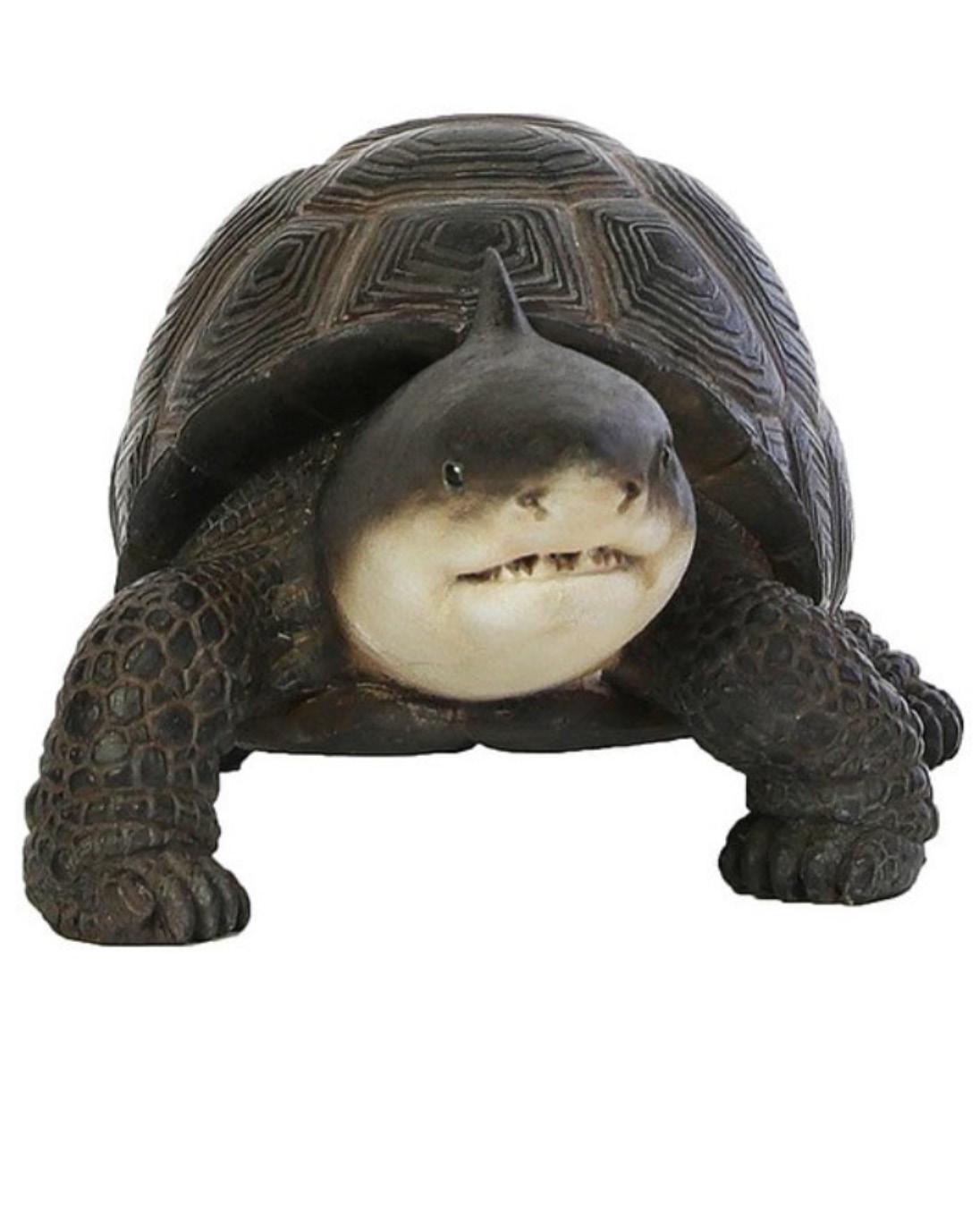
A Long Hot Summer Day
By Sammy Flood
Burning was the first thing I recalled. The sensation of the coarse sand mixed with the sun’s notable reminisce on the ground was anything but soothing. My ears were full of the bustling sounds of a summer day on the beach, seagulls squawking for a bite of a PB&J, and somewhere in the distance, you could hear the faint noise of the waves crashing against the shore. I walked towards an uninhabited spot on the beach, where the sand still lay absent from all the footprints, towels, umbrellas, chairs, and other people, the perfect location for the day. We threw down our towels and chairs and were subject to calls from our moms reminding us to apply sunblock and be careful in the water. Despite nodding our heads, like the seals somewhere in the Atlantic, there was no chance that these demands would be met as we had only one
. . . . . . . . . . . . . . . . .
thing on our mind, Wiffle Ball. We drew a field in the sand, used a chair for a strike zone, and upset virtually everyone in the 200 ft radius of our game. But that did not matter, as for the entire day, that ball that should have been a strike, or the home run that was definitely foul, seemed like we were debating for world peace at the G20. My shoulders blistering from the sun, my feet sore from the gravel-like sand, we returned to our moms. Gossiping the day away, they scolded us on our arrival for disobeying their commands to reapply sunblock. We sat there, briefly, gorging on sandwiches, chips, and Gatorade, supplying us with the abundant energy needed for the next 100-inning game. The night grew closer and closer, and the ball became harder and harder to see until it was finally time to leave. I walked home barefoot that day, across the street, past the rink, and up the hill, talking to my mom. We chatted about the day and dinner that night for our few minutes together. I got home, showered, and ate, catching up with my dad about his day and jeering and jousting at my sister. I complained about putting the dishes away and wiping the countertops while making sure to annoy my sister every time I passed her. I once again tried to watch a show with my dad. I sat on the couch, skipped the intro, turned my head, and he was already asleep. I hop
into bed, exhausted from the day, only thinking about doing it again tomorrow.
A Love Like No
Other
By Griffin Vail
His new life was discovered on Easter Day, 2011. It had become a family tradition that we would go to the Country Club for breakfast about five minutes from my house on the day of resurrection every year. Easter day was never a big deal to my brother and me, but this occasion called for a good time. After waking up, we were fashionably late as we drove to the club. The Easter Bunny stood outside the front double-door, decked in white, with a basket of fake eggs in his hand. My brother hugged him, the affectionate thing he is, and we walked into the fancy building. A buffet was set out for all attendees, and af-
. . . . . . . . . . . . . . . .
.
ter some highly fattening pastries, I was ready to embark on my egg-hunting journey. At these functions, an annual easter egg hunt occurs where whoever finds one of three golden eggs scattered around the premises brings home a stuffed animal rabbit. I remember telling my brother, “I’m winning, and there’s nothing you’re going to do about it.” After reminding my inferior that I was better than him, I lined up, ready to start.
I looked around at my competition, confident I could box them out. The only thing between a stuffed bunny and I was some carpet. I was so excited that I almost missed when the parent announcing the event yelled, “Go!” I shot off like a bullet from a gun, sprinting for the visible eggs. Much shoving was involved as I attempted to fulfill my goal. Eggs were being found by the second by both my brother and me. Finally, when it seemed like all eggs were gone, someone found a golden one. My heart was broken, and my soul was crushed; there were only two golden eggs left, and with the other kids on the prowl, I needed to act promptly to take something home. Five minutes later, with no luck on my end, a girl stumbled upon the second golden egg. On the verge of crying, I started becoming aggressive, pushing my way around the
room, trying to find the shimmering spectacle hidden in some furniture. As I was looking by the corner, I heard a nasally “I found it!” from a fat kid named Jenny across the room. The rule was that to win, the golden egg must be held and carried to the judge. I sprinted like my life depended on it and dove for the treasure. The girl that announced her finding was flattened as I barrelled by. I snatched the egg, scrambled to the judge, and was given my prize. The rabbit I got was pretty big, sitting at around two feet tall with tan fur, two big eyes, a bowtie, suspenders and, most importantly, massive ears. These two hearing devices were big as footlong hotdogs and flopped as a bird’s wings do. His attributes merited a name, Floppy Bunny Ears. From that day on, I went everywhere with my new friend, whether that be the movies, the store, or even dinner; this furry animal was always with me. Right when I got home from breakfast, I tore off his bowtie made of a rough ribbon as it was obstructing my ability to snuggle with him. We had so much fun together until he vanished one day during the summer. Right into thin air, he was gone. I cried for a week straight, mourning the loss of my companion. My friend Sebastien had slept over for a night, and the next, Floppy Bunny Ears was gone. Two weeks passed without a sliver of hope un-
til I finally got word that he was taken by Sebastien on accident and was being mailed back to my house. I was overcome with joy, knowing that the memories I share with the rabbit would continue. To this day, Floppy Bunny Ears sleeps in my bed, providing me comfort through the long nights. It is easier to be away from him than back then, but I still appreciate his company. Out of all my possessions, he holds more value than anything else. The treasure that I flattened a girl for is now a legendary rabbit.
Tweet Tweet
By Panos Gianoukos
The game started, and both teams fought for the ball. It was Weston vs. Roslindale Greek Church basketball semifinals.
“Hustle, Pano!” My dad stood in the bleachers yelling. My adrenaline was fueled after watching a Dennis Rodman defense mixtape my dad shared on the way to the game. My heart was about to burst from exhaustion. I continued running up and down the court
. . . . . . . . . . . . . . . . .
to ensure the other team did not get an easy point. I was the only ninth grader on the team, and most of the kids on the Roslindale starting lineup were seniors in high school. Everyone’s bodies seemed taller and bigger than mine. Regardless of their size, I continued to show them a tough time on defense. Tweet tweet.
The score stood 38-30, and the first half finished. We were winning by 8 points. Coach hurried us into the huddle to talk strategy.
“Good work, everybody. Going into the second half, remember to stay big on defense and continue to set picks on offense. All right, Peter breaks us down.” Coach declared.
“Weston on 3; 1, 2, 3,” Peter hollered. During the second half, both teams stood relentless. The parents continued yelling in Greek and English. All of a sudden, the crowd went wild. I had turned my back on the play for a second and missed Peter, my third cousin, who had splashed a three-pointer, one of the many that he scored in that game. Three minutes left in the game when the other team called a timeout. The score stood tied at 52-52. Although the whole team wanted to pass out, the job still stood unfinished, and Coach explained how we needed to win this game for our families and each
other. I continue to sprint at full speed on offense and defense, and with 20 seconds left, I spin around my defender, thrust my body in the air like a bird, and gently let the ball roll from my fingers into the hoop to give us the lead. Their coach uses their final timeout to draw up a play. They needed to score just one bucket because the score remained close, 62-61. Our coach tells us to play defense and stay close to him.
“DO NOT FOUL,” he yelled.
As the whistle blew and the remaining seconds started ticking off the clock, their point guard dribbled the ball up the court. He takes a massive side step from the top of the arc and throws up a deep three-pointer as the final buzzer sounds while the ball is still in the air. The ball hits the rim twice before it falls into the hoop. The gym erupts, but I can hear nothing. First, I looked at my teammates and then at my parents. When I saw everybody’s melancholic expression, the truth sank in. We had lost. Despite the tough loss, I learned much during these basketball games this season. I worked hard and improved my skills. My parents could not be prouder. I also learned that discipline and practice would help me improve even more. Losing to Roslindale by a buzzer-beater in the semi-finals has motivated me to work independently
during the offseason. I am counting the days until we can beat them. I will give them no mercy. Hopefully, I will be taller by then.
Their Last Goodbyes
By Rylan Dean
“We are going to run some errands for a few hours. You two can play video games for as long as you would like,” said my mom on a gloomy Saturday in our house, a house that I would soon move back and forth from every week.
I remember that night. I remember the lobster tasting a little blander than usual; it did not fill my mouth with rich and creamy juices like it used to. I remember the air feeling a bit cold, a little abnormal for a house that keeps its air running two degrees over 75. I remember the lights looking dimmed to the point where the room gave off a dark yellow glow, just enough light to see their teardrops drip down their faces like little children longing to see their parents in the car pickup line at school. Each droplet sprinting
. . . . . . . . . . . . . . . . .
down their cheeks hurriedly but stopping for a break at random moments. I remember the world feeling off that day; I remember the last time I would ever see both of my parents in the same room together; I remember the last time both of my parents held hands. That day changed everything. That day changed my life. Well, those few hours turned into almost an entire day, and… actually, I believe my parents were gone for well over six hours. Their arrival, their soft words, and their support made my heart drop. I knew what would transpire. Then it happened, the talk. The talk that would transform the way I live and who I live with. It took hours of crying and hugging through the night to ever overcome my grief. While it seemed like a last night for many things, I looked at it as the last time with a complete family.
The blanket I cried into still sits on the ledge of our couch at my dad’s house. It is no longer soaked with lost memories and improbable futures, but rather new beginnings and silver linings. I experienced one of the worst moments of my life on that night. An indescribable feeling entered my soul and has never left since. A sensation of what could be versus what
was. However, my experience has allowed me to cross paths with many great people, and my resilience has shown me how to overcome life’s many challenges. I have met many new kids at Belmont Hill who I would have never thought also share similar experiences as me, allowing me to find better ways to handle these situations. I have also learned many valuable lessons that I use to further conquer life’s everlasting battles. While I have struggled to overcome the realities of my parents’ divorce, it has shown me how valuable resilience can be to aid you in battling your greatest obstacles.
A Tradition Like No Other
By Eli Norden
My family’s origins are all over Europe: Lithuania, Hungary, Russia, and mainly Poland were called home by Katzowizes and Neritens for generations. However, as middle-class Jews in Europe, the Sec-
. . . . . . . . . . . . . . . . .
ond Millenium was by no means an easy one. From 1900 to 1915, my family immigrated to The United States of America, hoping for a more secure life for themselves and their prosperity as many Europeans— struggling or not—did in the late 1800s and early 1900s. Most of these immigrants would disembark from their arduous journeys in New York City, passing through Ellis Island; however, my maternal greatgreat-grandmother took a different route because it was the only way she could find transportation. From Dolginovo, then-Poland, with her toddler-age son strapped on her back, Peshka Katzowiz traveled on foot and by train through the Russian tundra and diverse climate of China before embarking on her maritime journey to San Francisco. She traversed across the country from San Francisco before settling in New York City. She brought in money through side gigs and sent money back home to her family. Eventually, the entire Katzowiz family was living in the U.S. Of the very few items she brought to the States, Peshka brought her beautiful silver Shabbat Candlesticks, which are still used in my household to this day.
Judaism has always been one of the most important aspects of my family, and these candles symbolize
both the hardships of Jews and the surviving traditions of the Jewish people that can be traced for millennia. One of these traditions is the weekly holiday of Shabbat, lasting from sunset on Friday evening to the appearance of three stars in the night sky on Saturday. My family’s precious Shabbat candles have been in consistent use for centuries. I can better understand my family’s and people’s traditions through my ancestors’ gorgeous candlesticks. Whenever we use the two candlesticks to bring in the Sabbath on Friday night, I can picture those who came before me using the same candles, saying the same prayers, and admiring the same beautiful candlesticks in their front windowsills.
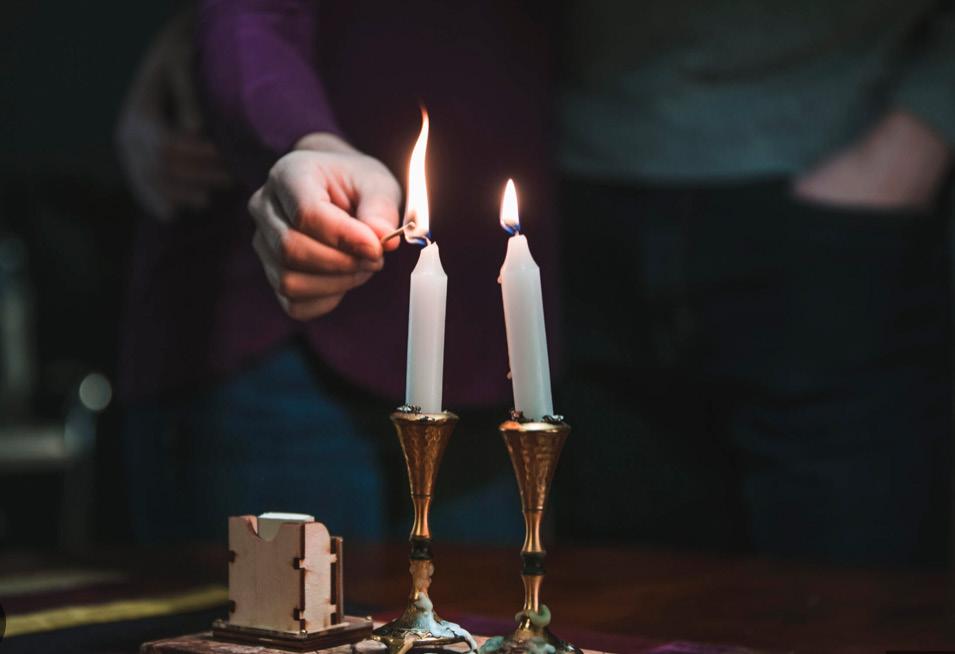
Built Different
By Michael Hadley
Friends are more important than family; your family may provide for you, but you did not choose them. This statement does not mean that I do not love my family; I do, but I did not have a choice of the family; that is why I value my friends more; I choose them, and they choose me. My friend Nolan Sulivan displays this idea, we both decide to become friends; and I care for Nolan like he is a brother. Nolan means so much to me because he cares about our friends and me. I can confidently say that Nolan Sulivan checks in on me more than anyone I know. For anyone reading this who knows Nolan, this is a ridiculous claim. People would think this because Nolan pursues an outgoing lifestyle and will do anything to make me and my friends laugh; people may think this means he does not retain common sense, but in reality, Nolan only cares about being a good friend. He will do whatever it takes to ensure my friends, and I have a good time. I did not realize how much Nolan meant to me until
. . . . . . . . . . . . . . . .
.
he started talking to me about his life and challenges. I see and hear about people’s difficulties every day, but they often go over my head, like the countless amounts of nature facts Mr. Mcalpin recites during class, but when I heard about Nolan’s, it felt different. I sat down, listened to him, and pondered what he said. One night lied in bed, and I just began to think about how I do nothing for someone who puts so much effort into making me happy. However, I know that Nolan does not act the way he does in search of praise or his actions being returned; he is simply built to be a friend.
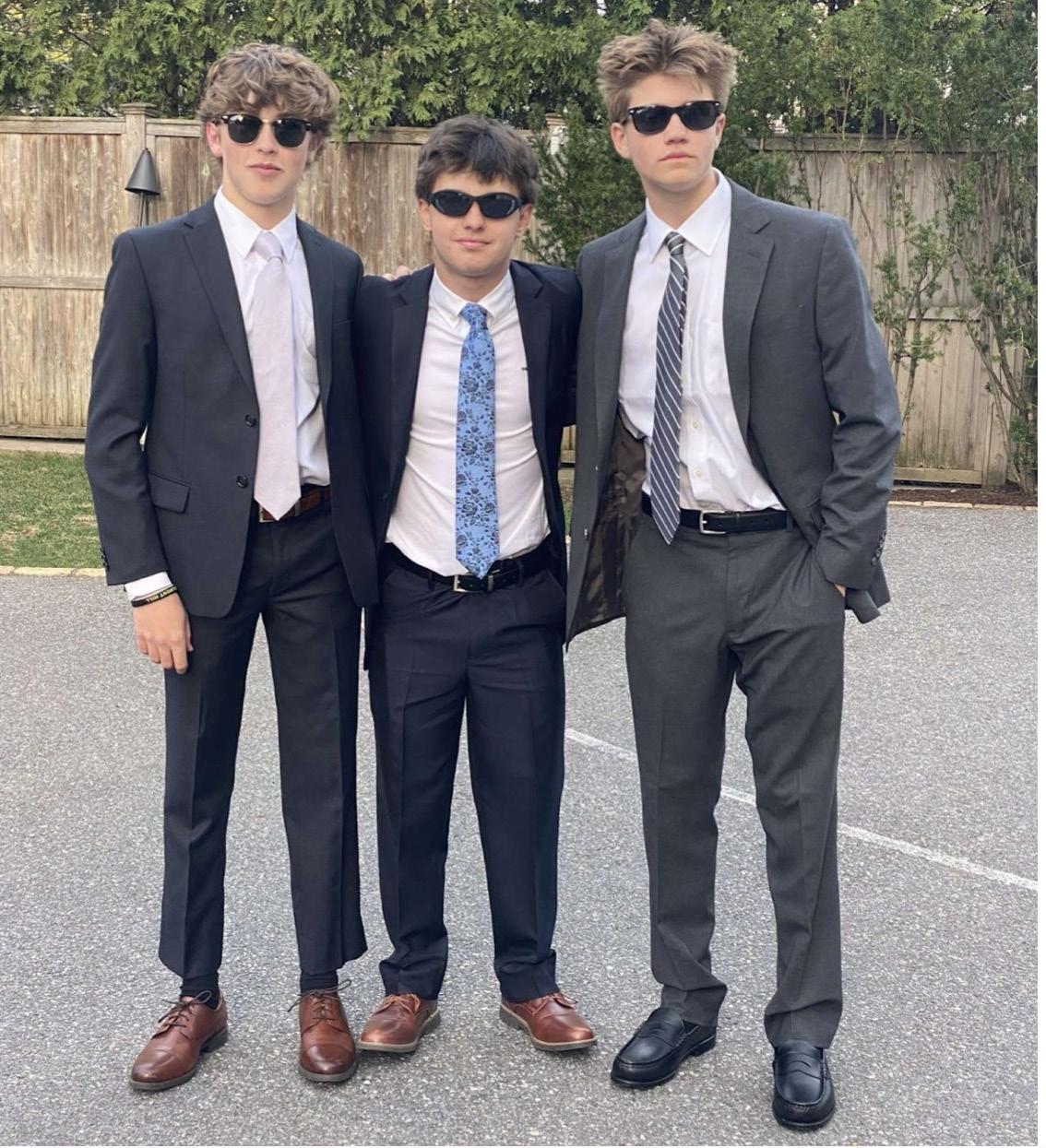
Moonlight Sonata
By William Jones
My interest in piano has always been a hobby that I have greatly enjoyed. In third grade, I listened to Beethoven’s Moonlight Sonata and Immediately fell in love with the piece.
Overall, the piece follows a slow and sorrowful, and beautiful melody with a wonderful progression of arpeggios.
Objectively, my third-grade self did not have the skill to play this amazing piece the way Beethoven wrote it, so my piano teacher found a simplified version of the song.
Now, the simplified piece was nothing like the original work but still had the same melody and overall feel of the piece. My passion for Beethoven’s music, as well as my fondness for the song, progressed quickly.
Leap forward a couple of years, and I had progressed to another spectacular piece, Pacabell’s Canon in
. . . . . . . . . . . . . . . . .
D, and as expected I had finished the piece, and the moonlight sonata had passed into a distant memory.
I had come to a dilemma, what should I play next? I paused with a melodic version of writer’s block.
Given my current situation, I had to think up a piece, any piece, to learn and enjoy.
However, nothing surfaced for the second week in a row. I could simply not find any inspiration.
Then it came to me. Finally, I would commit myself to learning the real, the actual Moonlight Sonata, It felt perfect.
So the following weeks came along with excitement and renewed my love for Beethoven’s music.
Overwhelmed with anticipation, I eagerly waited for my next piano lesson when I would receive my new piece, the Beethoven original.
Now my teacher warned me that playing this wonderful work of art would take perseverance and patience given my current skill level.
And, my love for this song fueled my determination. The next few months my progress flew right by. At times, the piece seemed impossible to play, but as I went, note to note, my progress turned into line to line. Finally, I finished this wonderful piece and would forever remember how to play it. All together, one of the best lessons I learned from this is that sometimes big challenges require little steps and note-to-note focus.
My Teacher, My Best Friend, My Sister
By Benjamin Gong
“Do you wanna play outside?” I walked into my sister’s room on a Saturday afternoon.
“Sorry, no. I have to study for my AP physics exam.” Of course she was. I just went outside and played by myself. When I peeked inside her room two hours later, the sweet, lavender fragrance of her candle lamp only intensified, but with more than half the wax burned out. Nothing in the room had moved an inch,
. . . . . . . . . . . . . . . . .
burned out. Nothing in the room had moved an inch, including her.
My sister always toiled tirelessly, like an indestructible machine, for every exam through any circumstance; she traveled for fencing competitions ten times more than I did, which significantly curtailed her time for studying. However, she always found a way to work through this challenge by studying at the airport, hotel, and sometimes even on the plane. Last summer, my family went on a one-week cruise, and my sister immediately bought unlimited Wi-Fi for the entire week.
“Why’d you pay for Wi-Fi? We’re on vacation. Why are you always using your computer?”
“I have to do work.”
I later found out that she had an important interview for an internship the day we disembarked. Every day that week, by the time I woke up and ate breakfast, my sister was quietly working at a table. I would play soccer on the upper deck for hours, come down to the lower deck to get a drink, and she would still be on her computer.
For as long as I can remember, my sister has always been there to help guide me. When I was just five years old, she taught me basic math, reading, and
handwriting. Along every step of my education, she has been the most prominent figure in my development. I owe my reading, grammar, writing, and all literary skills to her tutoring. Her incredible diligence and efficiency serve as an ideal example of what I strive to achieve every day.
For my whole life, my sister has been my tutor, role model, and best friend. Because she is six years older than me, she’s always above me in maturity, intelligence, and height (or at least until 2020). She is the sole confidant in the world that I trust the most.
When I go to sleep at night, I miss the bed creaks audible through the wall, the annoying sounds of a FaceTime call being picked up next door followed by giggling, or just the assurance that I would see her the next day, and that there would always be another chance to play outside.
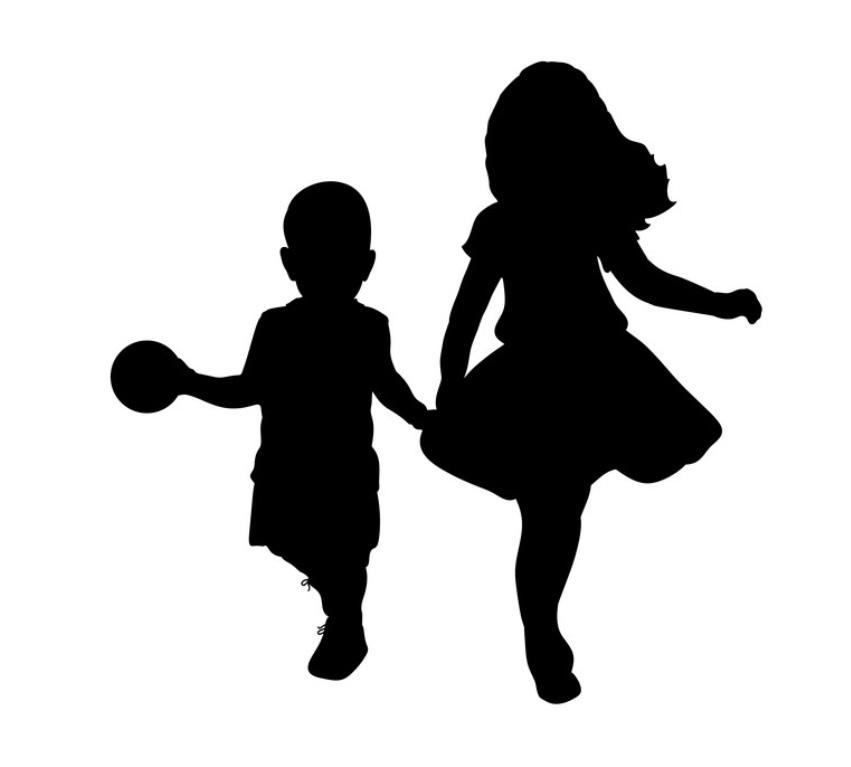
Twinning
By Henry Ramanathan
My twin brother Jack has been in my life for quite literally the entirety of mine. Well, I guess I had two minutes without him, but after that he’s been in my life. Jack and I have grown together, attending the same schools in the same grades, and have visited doctor and dentist appointments with each other. We both share the same summer birthday on July seventh every year, wear the same clothes or hand-me-downs from our older brother. Jack is part of my life. And, even at this point, part of my identity. Growing up, Jack and I were each other’s constant companions, and remained inseparable.
Eventually, we started from distinct ideas, interests, and personalities. We realized that one was better at some things, and the other the better for others. However, we stayed together and were still almost always together like a shadow to a body. But at the same time, both the two of us were each slightly seek-
. . . . . . . . . . . . . . . .
.
ing to differentiate ourselves. The “Are you Jack or Henry?”s and “You both look so alike”s were beginning to get to us. One day, one of the “Do you guys finish each other’s sentences?”s made me realize what being a twin meant to most people: two inseparable brothers who are always together, or exactly what Jack and I were. But this didn’t sit right with me. That I was supporting the stereotype. It made me feel as if I wasn’t really making a difference in life. And Jack also realized it as we got older. Yet, despite the attempts by both of us to differentiate ourselves, the stereotypes just kept on coming. And elementary school me wasn’t happy about it. Elementary school me couldn’t fully embrace being a twin because he didn’t like the comparisons and whatnot.
It’s six years later, but now I can and do fully embrace being a twin. But it’s not because the stereotypes went away, or that I’ve given up on my quest to alter myself from Jack. I now embrace being a twin because I accept the stereotypes and realize that they don’t matter. If someone asks a silly question about being a twin, there’s no point of feeling anger, because I acknowledge that it really only matters how I view myself, and now how others view Jack and myself as twins.
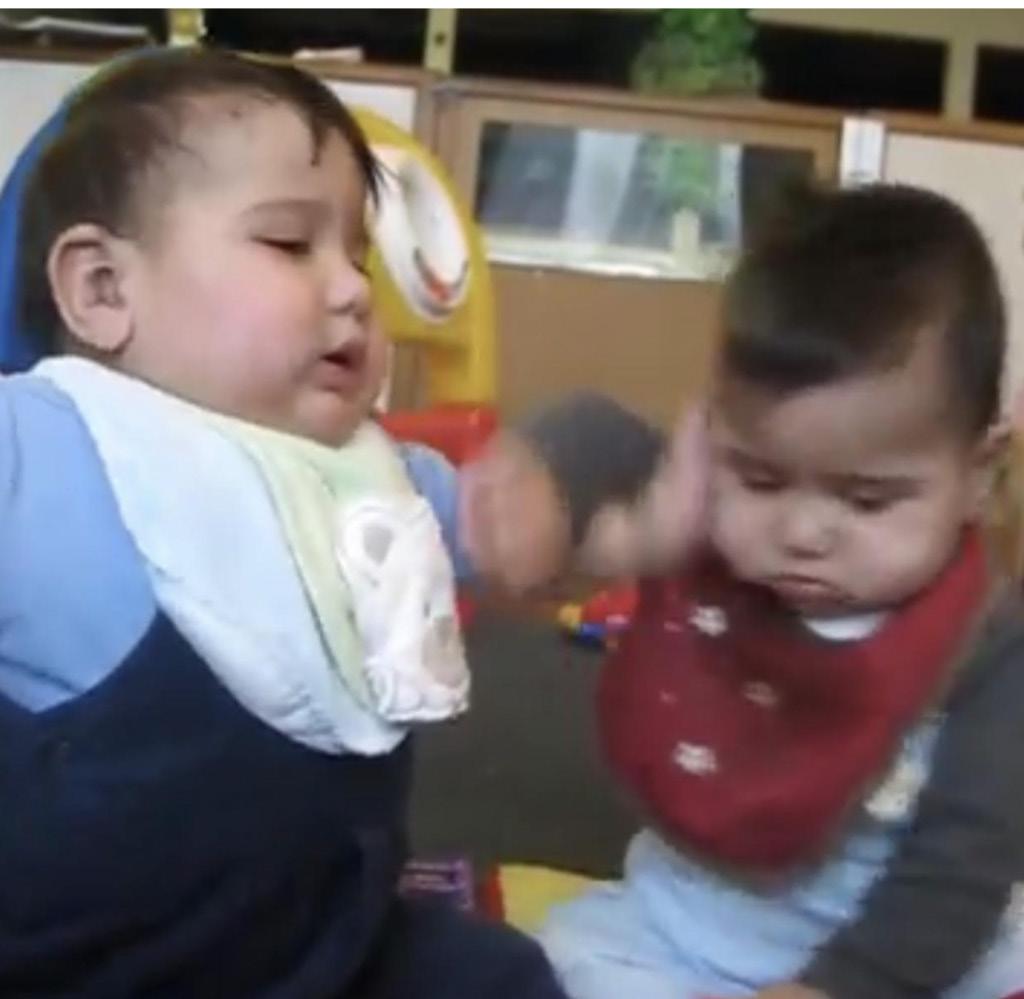
High, Wide, and Handsome
By Lucien Davis
Montana, “Big Sky” country, is like no other place on the planet. Despite its fame, it remains largely untouched by man. Our home in the Madison Valley is twenty minutes from a small town with a high school that plays eight-man football, a gas station, and one year-round restaurant. The sign at the entrance to town boasts that there are 800 people and 8,000,000 trout.
The valley containing the town stretches longer than Eastern Massachusetts. Untracked acres of lush grass fields unfold in every direction. The waves of grain are only disturbed at the valley floor by Route 287 headed south to West Yellowstone and the iconic Madison River running parallel. As the valley gallops towards the mountains, it forms a series of perfectly flat low plateaus that the locals call “benches”. Beyond the benches rise the mighty Northern Rockies
. . . . . . . . . . . . . . . .
.
where the upheaval of our continental shelf is abrupt and impressive. In the summer one may still see snow-dusted peaks while floating the river on a hot day. This, as they say, is “beer commercial” quality scenery.
The grandeur of the landscape sometimes makes me reflect on the increasingly limited number of such magnificent natural scenes. The paradox of outdoor recreation is that protecting areas in parks leads to greater enjoyment of special places, but greater traffic in those areas makes them less special. The Madison Valley exists in a unique time warp. Ranchers have owned the land for generations and parks tend to be limited to the upper ranges of the mountains. Some ranchers have turned over to conservation-minded new owners. The land remains unspoiled by guard shacks, paved roads, hotels, t-shirt shops, and all the other trappings of the modern national park. Access is more sporadic and limited. But, if you ask nicely, there is usually a way.
The mere existence of such an awe-inspiring place has motivated me to want to make any small act I can to support conservation, in either its public or private form, to give my children, grandchildren, and anyone else the chance to be captivated by the grandeur of this place. It is not only the sheer beauty that has cre-
ated my connection to this area. Before I was born, my family began coming here every Christmas and Spring. I recall ‘antler-hunting’ when I was 4 years old, as we stalked through enormous brush and searched through small creek beds. I recall playing football with my dad and brothers, diving and running through the long golden grass, and trying a trust fall against the strong sweeping winds. I recall shooting clay birds over the bluff and living in a way that is just not possible in most places. Big Sky country is more than scenery, it is memories and joy. I will do everything I can to make sure that it stays like the cowboys say: high, wide, and handsome.
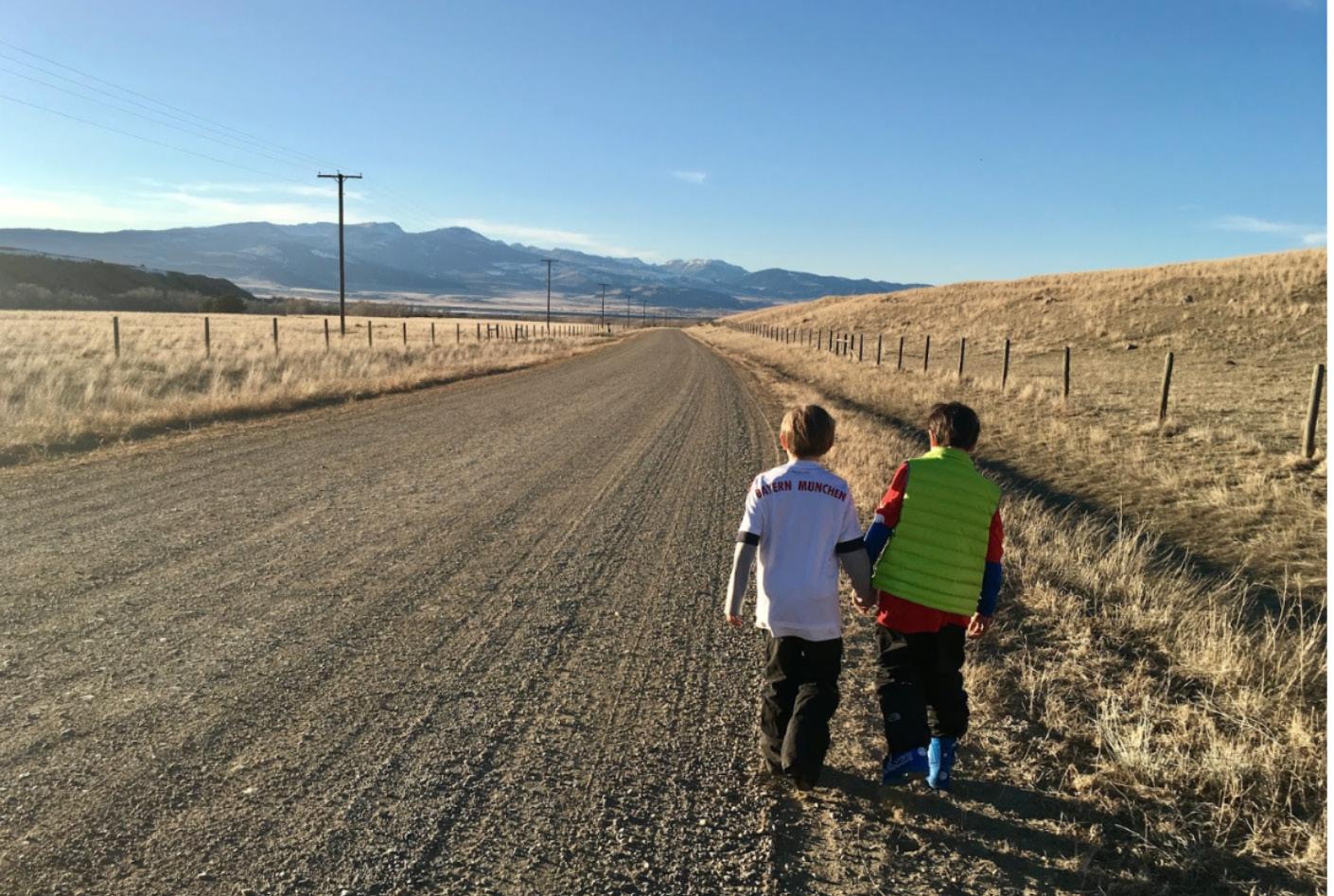
What Belongs to Me, But Others Use More Of?
By Adonai Samuel
My Name, Adonai. is a Hebrew word. It means God, in Ethiopia every christian has a name to do with either the Torah or the Amharic bible. My sister’s name is Bethel which means the house of God, my mothers name is Mekdem which means the first child. In Ethiopia there is no specific way or process to choose a child’s name, but for my name I was told there were two options: Kidus which means saint, and obviously the name I currently have, Adonai. My paternal grandmother is the one who chose Kidus and desperately wanted that to be my name. She always tells me the story of how she chose the name and how it would’ve been a beautiful name. She still calls me Kidus every once in a while, and if I don’t respond im-
. . . . . . . . . . . . . . . . .
The Black Hand and an Idiotic Indian Man
By Jai Somani
“Aahaaaaahah!” The sound of the wicked black hand echoed throughout the valley, and villagers guarded their homes with spears and nets. And children slept, wrapped beneath blankets which provided a guise of safety. The howling got closer, then a *rap rap rap* on the window. The little child, who knew no better, opened the window. No scream was heard, just a thump. When the parents went to check, the child lay in a pool of blood on the floor, missing only its windpipe.
My younger cousin Persis and my sister Leyla recoiled in fear, hiding under the blanket like the child, pfft, like that would keep them safe. My cousin Ellora
. . . . . . . . . . . . . . . . .
and I sat there, our eyes wide open. Were we scared? Hell yes, she was grasping Persis’ hand like the Black Hand grabbed people’s throats, and I sat there eyes wide open. “Yeah ok, Bapu’’ (a name for my grandfather) “but what does a hand do with windpipes, it’s not like you can build a body out of them”. “Jai,” he said “The devil’s hand flies back, windpipe in hand and feeds it to his pet wolf” That was enough for four-year-old Jai, I gulped, and the fake blanket of indifference fell like a rotten tree branch. Of course, the black hand was hunted down by my great grandfather Soli and was sent back to hell, it would return of course, but it was a temporary victory. My sister chimed in, “Tell us a Bunga story Bapu”. “Yeah Bapu! A Bunga Story”. We all agreed, nodding our heads. With a hearty “ha,” my grandfather agreed.
Bunga, a thirty-seven-year-old or so Indian man who farted every time he bent down, had a thick accent, and handlebar moustache and was notorious for his failed crimes including kidnapping, passing off turtle meat as ground pork and rigging horse races. He is perhaps the funniest character ever written. “I will shove, Iron rod, up your, BUTT” The man yelled as Bunga ran, stumbled, and then crawled away from
the house where the Kentucky derby organizers were meeting, leaving behind a noxious cloud of gas. We keeled over in laughter, unable to control ourselves. In retrospect, the character was a bit crude, but he was well-written and able to make children laugh.
“Dinny,” my grandmother yelled from her bedroom. “It is eleven o’clock. Let those kids go to bed”.
“Noooo, Bapu please can you tell us more stories?” We begged, but he knew it was time for us to sleep, so he left.
One weekend when I was seven or eight, I was at a hotel called “La Passage” in the mountains of China. My best friend Oliver’s father owned the hotel. One sunny day, I sat with my friend on the pool deck.
“Bapu!” I yelled, “Please come tell us a story”, and he obliged. “Scary, or funny?” he asked. Oliver, who thought he was grown up and had claimed to see many horror movies, said “Scary”. There, in broad daylight, my grandfather told a black hand story. I knew it was set in India, so I never worried about this. But Oliver clearly sucked at Geography because we shared a room with two single beds that night and he kept leaning over saying “Jai? What if the black hand comes”
“He won’t”
“But he will kill us”. So I got up, walked next door to his parent’s room, knocked on the door and said “Oliver is scared, he ran into their room and I finally got peaceful sleep. The next morning over breakfast my parents told me that Bapu would no longer be telling Black Hand stories on this trip. “Just because Oliver is a scaredy cat Bapu can’t tell stories?”, “Jai,” my mother replied, “be nice”. I looked down the table and Bapu smirked at me as my grandmother (Gammu) snickered.
My grandfather is a great storyteller, he made a child cry with just one scary story in broad daylight, in fact, he gave my eight-year-old cousin Tenzin night terrors in the summer of 2019. Even now we ask him to tell us his original stories before we go to bed. While they are now more about the family history, on rare occasions as a treat, he’ll still tell chilling stories about the severed black hand and make our stomachs hurt with laughter as he details the misadventures of Bunga.
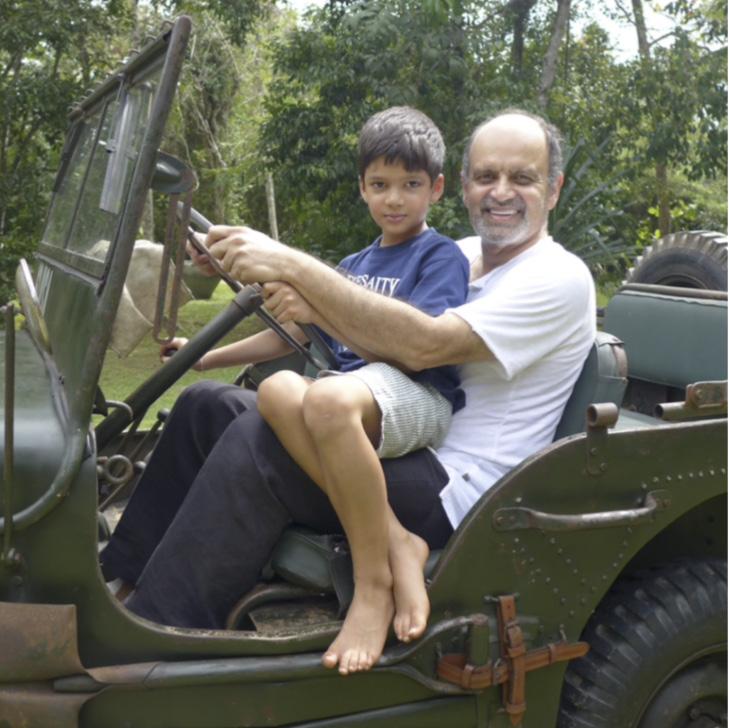










 By Mattias Liem
By Mattias Liem







